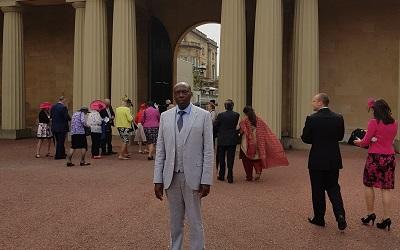You are here
- Home
- Year of Mygration
- Day 150, Year of #Mygration: Migrants as Agents for Change - Cosmopolitanism
Day 150, Year of #Mygration: Migrants as Agents for Change - Cosmopolitanism

Today’s blog post is written by Dr Fidèle Mutwarasibo, Visiting Research Fellow in the OU’s Centre for Voluntary Sector Leadership.
Today I will look at the migrant as an agent who influences structural issues and how this impacts on their integration. As discussed in my previous post, Does Diversity Impact Negatively on Social Capital?, migrants may choose to build either ethnic social capital or cross-cultural social capital. Their migration journey, reception upon arrival and thereafter, educational attainment and cultural competences will also affect how they engage with public institutions in their countries of destination.
There are three approaches to studying migrants’ attachment or non-attachment to their ‘host’ country’s political institutions. These are: diaspora nationalism – which focuses on their sense of alienation, displacement and nostalgia; neo-communitarianism – which entails the establishment of their own ethnic culture in the host society; and cosmopolitanism – in which the migrants’ emphasis is on exercising civil, social and political rights in a similar way to that achieved by members of the majority population. For some, however, the options remain limited due to the size of their community, the cause of their migration (whether it was forced or voluntary), the openness of their host communities to diversity and the host nation’s political discourses on immigration.
In my case, as articulated in my blog post Developing Social Capital in a New Home Town, cosmopolitanism was a natural choice. Such an approach underpins my firm belief that no one should be denied social citizenship – a citizenship based on being active in the community in which one lives – irrespective of their official citizenship, or lack thereof.
No one should be denied social citizenship – a citizenship based on being active in the community in which one lives – irrespective of their official citizenship, or lack thereof.
Cosmopolitanism entails, i) egalitarian individualism – whereby humankind is regarded as belonging to a single moral realm; ii) reciprocal recognition – in which this status of equal worth is recognised by all; and iii) impartial treatment – all claims are subject to rules that all can share. In other words, migrants such as myself who are eager to engage with mainstream institutions will only succeed when these institutions are open and willing to play their part.
It is one thing to accuse those taking the routes of diaspora nationalism and neo-communitarianism of excluding themselves; it is another to deny proponents of cosmopolitanism opportunities to engage and interact with other members of the community and the host country’s institutions. Cosmopolitanism works best when there is strong legislation and institutions surrounding equality. Through cosmopolitanism, in Professor of Sociology Kwok-bun Chan’s words, we can “look to the unspectacular, practical, everyday life activities that allow movement beyond group identities to the business of simply living together and solving practical problems collectively”.
Most policy makers and opinion formers argue that integration is a two-way process. I would argue that, from a practical point of view, it is a 1.5- versus a 0.5-step process, with migrants making the former and the receiving society only the latter. My contention stems from the fact that the established community and its institutions set the rules of the game, often with a lack of any direct and meaningful representation from the migrants. The era of populism in which we find ourselves – in which migrants are blamed for the many ills in society – serves to underscore my point. Recent comments by German footballer Mesut Özil on the reason for his retirement from international football, in which he claimed “I am German when we win, an immigrant when we lose”, highlight just some of the challenges we face.
Culture is dynamic and evolves. Dramatic changes in culture and identity can, however, exacerbate the fears of those who feel overwhelmed by the recent speed of change due to globalisation and massive migration movements. The rise in populism in Western democracies underscores the task at hand and the need to support migrants who are pursuing a cosmopolitan approach to integration.
A cosmopolitan approach opens up possibilities for migrants to work with other excluded and disadvantaged communities. In turn, by avoiding the emergence of a hierarchy of ‘deserving’ and ‘non-deserving’ communities, this helps to prevent fuel being added to the fire; a fire that is so often exploited by unscrupulous opinion formers. Stereotyping is one of the symptoms of this malaise.
Both the Intercultural Cities and Cities of Migration programmes highlight initiatives aimed at diversity/immigration and challenge myths around integration. Closer to home, a commission set up in the aftermath of the London bombings of July 7th 2005 echoed the importance of busting myths around immigration. The various campaigns I have been involved in in Ireland and the UK, including Transport Links, Racism Divides, Count Us In and Fight Against Hate campaign have one thread in common: promoting non-discrimination and social cohesion. The campaigns I engage in adopt a collaborative approach. This means that I am always open to constructive criticism, to compromise and to engaging in win-win initiatives that are based on the benefits of many.
My approach is by no means unique. When I interviewed highly civically active migrants in Ireland for my doctorate, I discovered that most of their approaches to activism were embedded in what Michel Foucault calls, in Sex, Power and the Politics of Identity, creative resistance. Through this, individuals from migrant communities can “affirm themselves; not merely affirm themselves in their identity but affirm themselves insofar as they are a creative force”.
In his 2008 paper Public Spaces of Dissent, John Michael Roberts wrote that creative resistance denotes “an active stand against structural (e.g. structural forms of inequality) or strategic (e.g. the policies adopted by a particular government) sources of power usually through types of organised political or social activism” (emphasis in the original). As, however, Italian sociologist Alberto Melucci observed in Nomads of the Present, “collective actors are prone to disperse … into networks which quickly disappear into sects, emotional support circles and therapy groups”, arguing that “the potential for resistance ... is located in the … experience of the individuals or groups who practice the alternative meanings of everyday life.”
Although migrants as a voting group lack the power to influence migration and integration policy and practice, cosmopolitanism coupled with creative resistance does offer the potential to promote integration and social cohesion. Moreover, as I hope I have highlighted, it is also possible to effect change through collaboration with others and with relevant institutions.
Contact our news team
For all out of hours enquiries, please telephone +44 (0)7901 515891
Contact detailsNews & articles
Quarterly Review of Research
Read our Quarterly Review of Research to learn about our latest quality academic output.

